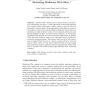Free Online Productivity Tools
i2Speak
i2Symbol
i2OCR
iTex2Img
iWeb2Print
iWeb2Shot
i2Type
iPdf2Split
iPdf2Merge
i2Bopomofo
i2Arabic
i2Style
i2Image
i2PDF
iLatex2Rtf
Sci2ools
COLCOM
2008
IEEE
2008
IEEE
Web Canary: A Virtualized Web Browser to Support Large-Scale Silent Collaboration in Detecting Malicious Web Sites
Abstract. Malicious Web content poses a serious threat to the Internet, organizations and users. Current approaches to detecting malicious Web content employ high-powered honey clients to scan the Web for potentially malicious pages. These approaches, while effective at detecting malicious content, have the drawbacks of being few and far between, presenting a single snapshot in time of very dynamic phenomena, and having artificial test data. To address these problems, we developed a virtualized Web browser that uses large-scale collaboration to identify URLs that host malicious content on a continuing basis by building in an elective reporting system. The system, which we call a Web canary, runs a standard Web browser in a known, pristine OS every time the browser starts. Users not only report malicious URLs but also benefit from protection against malicious content. Experimental results show that it can detect the malicious Web pages effectively with acceptable overhead. Key words: We...
COLCOM 2008 | Distributed And Parallel Computing | Malicious Content | Malicious Web | Malicious Web Content |
| Added | 18 Oct 2010 |
| Updated | 18 Oct 2010 |
| Type | Conference |
| Year | 2008 |
| Where | COLCOM |
| Authors | Jiang Wang, Anup K. Ghosh, Yih Huang |
Comments (0)

